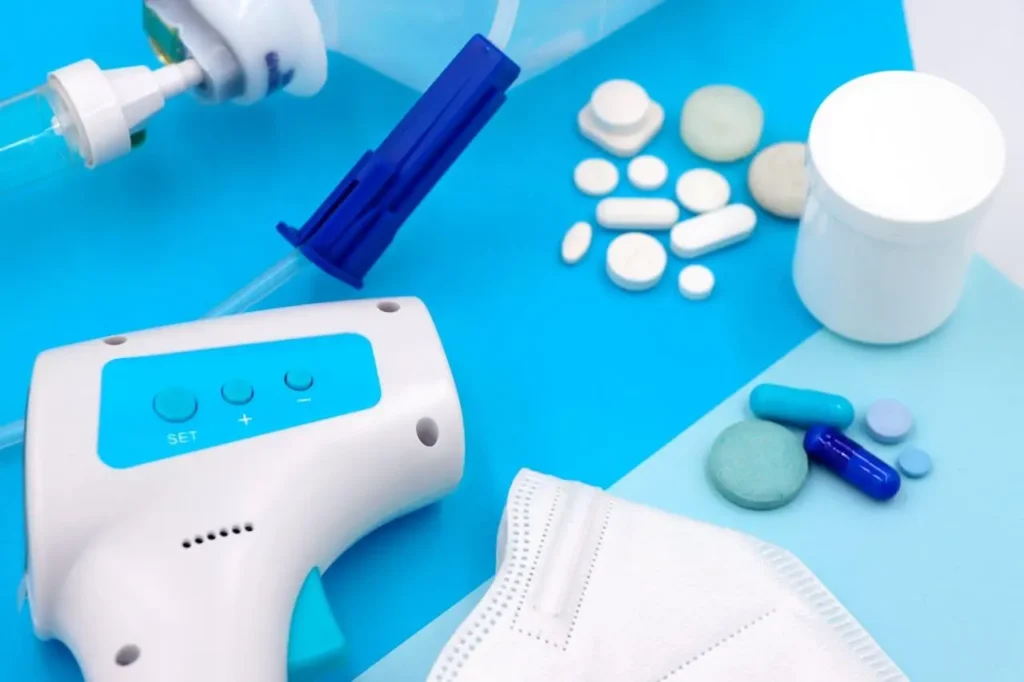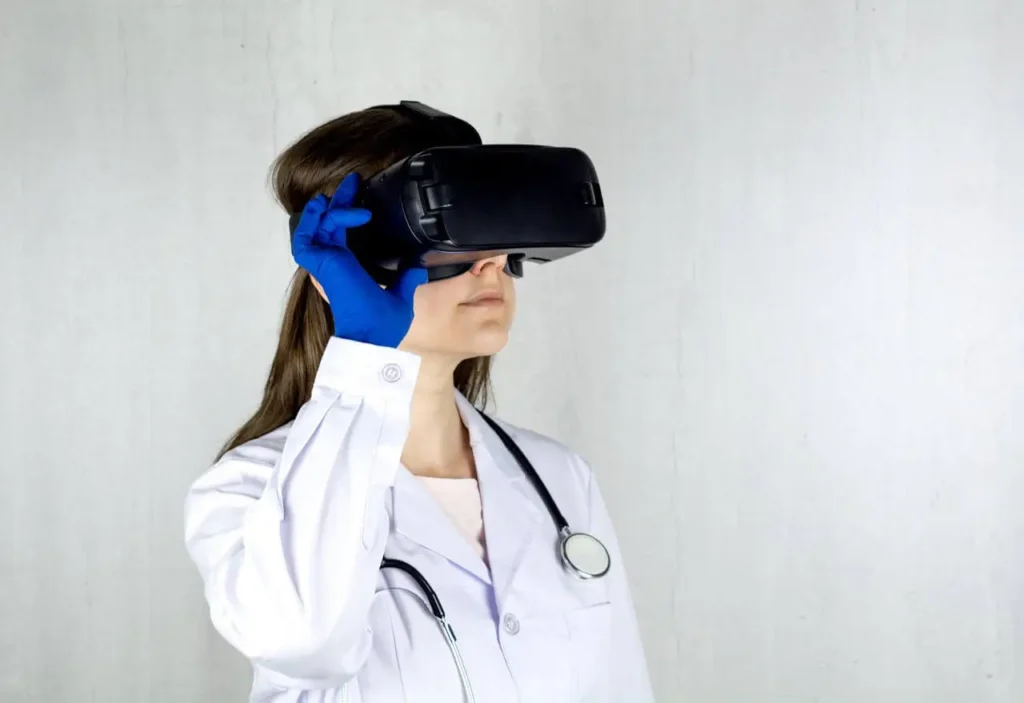Artificial intelligence and healthcare may sound like an unusual mix. However, it’s actually one of the most exciting areas of AI innovation today. New technology is reshaping how we diagnose patients, operate hospitals, care for patients, and so much more. Healthcare AI solutions are the true forefront of where this amazing developing technology can take us.
However, business leaders and marketers need to understand these changes to take advantage of them. AI use in healthcare isn’t just about clinics and hospitals. It’s poised to impact all companies in the health sector. Whether you’re an insurance provider or a medical device manufacturer, it’s time to see how artificial intelligence and healthcare partnerships change how we work.
What’s Driving AI Use in Healthcare?

In a way, AI use in healthcare showcases the real potential of AI overall. Imagine being able to save lives long-distance with telehealth and even telesurgeries. Or knowing immediately if your patient climbs out of bed against medical advice. Artificial intelligence and healthcare are some of the most exciting frontiers AI has to conquer. However, some key factors are driving the growth of AI use in healthcare, namely:
- Rising Healthcare Costs: Healthcare may be essential, but it isn’t cheap. AI can help cut costs by making healthcare businesses more efficient.
- Staff Shortages: Many areas don’t have enough healthcare workers, and the demand is rising. With AI to handle more routine tasks, doctors and nurses can be better used.
- Data Explosion: Medical data is growing rapidly. More rapidly than people can handle and still deliver great services. AI not only analyzes this information faster than people, but it also finds patterns they may miss.
- Patient Expectations: Faster and more personalized care is in demand. AI can help make this a reality, especially when paired with smart apps and devices.
Where Can Healthcare AI Solutions Make a Real Difference?
Artificial intelligence and healthcare have an exciting future ahead. Let’s look firstly at where it’s making waves now, however.
Diagnosis and Treatment
Healthcare AI solutions and diagnosis are two of the most exciting pairings we’ve seen. AI systems have an amazing role to play in analyzing medical imagery (think of X-rays, MRIs, CT scans, etc). It can spot potential issues the human eye might miss.
Somewhat like a detection dog, AI algorithms can “see” early signs of diseases like cancer. It may be spotting a tiny mark on the X-ray that the human eye can’t. Or it could be, just like that detection dog’s nose, the algorithm putting together tiny little data cues before they are detectable to people. Early detection is the key to better treatment options in most diseases and, ultimately, higher survival rates.
AI use in healthcare extends to treatments as well. That same data-crunching ability can help use the patient’s data and medical research to personalize treatment plans. This could even include their genetic makeup, medical history, and lifestyle.
Administrative Efficiency
Artificial intelligence and healthcare administration are also a great pair. AI systems can handle paperwork and billing and even schedule appointments. This reduces errors and frees up staff time. Hospitals already using healthcare AI solutions show savings in time and money. This will accelerate as the technology develops.
Remote Patient Monitoring
Wearable devices are more than just fun pieces of tech. They’re an amazing vector for AI use in healthcare monitoring. Now, we can track vital signals like heart rate, blood pressure, and sleep patterns using smartwatches and other IoT-like devices.
Through these devices, AI can analyze the data it receives. This lets it detect changes that might signal health problems. Again, it can alert healthcare providers before small issues become big ones.
Remote monitoring has incredible potential for patients with chronic conditions like diabetes or heart disease. Patients can get regular doctor care without having to visit the office frequently.
How Healthcare AI Solutions Benefit Different Stakeholders
AI use in healthcare goes beyond the doctor and patient to benefit all stakeholders. Let’s look at the benefits it brings to each key healthcare group.
For Patients:
Patients see considerable benefits from artificial intelligence and healthcare together, including:
- Faster, more accurate diagnoses
- Personalized treatment plans
- Convenient access to telehealth
- Better management of chronic conditions
- Expanded medical access
- Reduced medical errors
For Healthcare Providers:
The benefits aren’t just for patients, of course. Every healthcare provider, from doctors to nurses and pharmacists, also benefits from healthcare AI solutions through:
- Less time spent on paperwork
- Better diagnostic support
- More efficient workflows
- Reduced burnout with automation of routine tasks to support them
- Data-driven insights for improving care
For Healthcare Organizations:
Happier patients and happier staff are great for healthcare organizations, of course. But the healthcare AI benefits go beyond just that into:
- Lower operational costs
- Improved resource use
- Better patient outcomes
- Reduced readmission rates
- Enhanced ability to meet quality metrics
In short, AI use in healthcare works to achieve better outcomes for everyone, from the patient to the business itself.
Challenges in Artificial Intelligence and Healthcare
Healthcare AI solutions make powerful partners with our dedicated health professionals. But nothing is without challenges.
Medical data is some of the most sensitive data in the world. AI cannot be implemented without strict privacy standards that meet regulations like HIPAA. In addition, many healthcare facilities rely on older systems that may be difficult to connect to newer AI tools. However, it can be done with the right approach.
Plus, staff need proper training to make the most of healthcare AI solutions. They must trust the AI, and the AI itself must have strictly controlled data sets to foster that trust. Everything must be transparent, especially AI decision-making. Lastly, while AI can save money in the long term, the initial investment can be weighty.
Looking to the Future of AI in Healthcare

We’re only scratching the surface of what healthcare AI solutions can do. As technology develops, artificial intelligence and healthcare are set to become even more closely linked. We’re already seeing these exciting developments:
- Predictive Healthcare: As AI gets better at seeing patterns before visible symptoms appear, preventative care will get even better.
- Virtual Health Assistants: AI is showing immense potential for medication management. This could be especially useful for older patients and those with cognitive decline, ensuring they stay compliant. We could also see AI answer health questions (reliably) and coordinate care.
- Precision Medication: Those personalized treatment plans will improve from here. They could even start to consider patients’ genetic makeup and health profiles. There will be ethical considerations in that, however.
- Surgical Robots: Perhaps the most exciting potential AI use in healthcare is AI-enhanced surgical systems. Not only will this make direct procedures safer and less invasive, but it could also revolutionize care in rural and underserved areas.
The future of AI use in healthcare is genuinely one of the most promising and exciting areas of AI growth. We look forward to seeing even more innovations in time. It’s currently estimated that AI use in healthcare will generate between $60 billion and $100 billion a year in the coming years.
How to Get Started with Healthcare AI Solutions
While many of these potential AI uses in healthcare are only just being developed, the time to start moving is now. Not only does that give you the critical “first-mover” advantage on the business side, but it also lets you start integrating AI into how your medical staff works. This will help them adapt and thrive in an exciting, evolving field.
Begin by identifying the areas where AI has real solutions to your current challenges. With these in mind, select a targeted project to trial AI on. Don’t try for a full system overhaul in one!
Then, you need to find vendors who understand both AI and the intricacies of healthcare ethics and regulation. They should be able to help you train your team to work effectively with their new AI tools. From there, track the key metrics that matter to you to see the return on your AI investment. Then, you can focus on larger-scale rollouts.
Artificial intelligence and healthcare are some of the most exciting partnerships we’ve seen to date. Embracing this technology now will best position you for future healthcare success. With the right tools and clear goals, AI is ready to help you improve outcomes and your bottom line. If you’re ready to make the most of AI use in healthcare, reach out to us today. We’re here to help you get started – the right way.
Recent Posts
-
Published on: January 13, 2026
-
Published on: January 6, 2026
-
Published on: December 16, 2025








